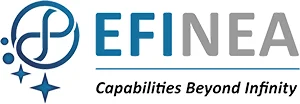Invar® (Free-Cut Invar “36”® Alloy, Invar 36® Alloy, NILO® 36, Pernifer® 36)
Invar® (UNS K93600) is a unique nickel-iron controlled expansion alloy. This alloy is produced by several companies all which have trademarked their own brand name. The following represents the trade names used: Invar 36® Alloy, Pernifer® 36, NILO® 36 and Invar® Steel. With a composition of 36% nominal nickel and the balance Iron, Invar Alloy has the lowest thermal expansion of any known alloy. Another key factor is that Invar exhibits a very low expansivity below its Curie Temperature. This anomaly has been termed “The Invar Effect”. For this reason, Invar Alloy is particularly beneficial in applications that require minimum thermal expansion and high dimensional stability.
Available in Free-Machining and Standard Grades
EFINEA is a leading supplier of Invar alloy which is available in various forms and sizes such as plate, sheet, & round bar/rod. A premium controlled expansion alloy, we stock two grades of Invar to meet the needs of our customers:
- Invar Free-Machining Grade (Free-Cut Invar “36”®)
- Forms: Round bar and rod
- Chemistry: Constituent Selenium of 0.2% added to aid in machining.
- Specifications: ASTM F1684, UNS K93050
- Invar Standard Grade
- Forms: Plate and sheet
- Specifications: ASTM F1684, AMS I 23011 Class 7, UNS K93603, MIL I 23011 Class 7 (Note: This specification, MIL I 23011 Class 7 has been de-activated by the US Military and replaced by AMS I 23011 Cl 7).
All standard stock items are ready-to-ship for those in immediate need of materials. Request a quote today!
The Discovery and History of Invar
This nickel-iron alloy Invar was discovered by Charles Edouard Guillaume in 1896. Charles was employed at the International Bureau of Weights and Measures and he was investigating metals that would not change in length when exposed to temperature variations. He was seeking a cost-effective material with a perfectly defined length for reference bars that could be used as a secondary standard throughout the world.
Guillaume was experimenting with nickel-iron heats and discovered that the coefficient of expansion at room temperature was lowest at a nickel level of 36%. In fact, with 36% nickel, the alloy heats exhibited the least amount of thermal expansion of any alloy known. Guillaume called the alloy expansion “invariable” and hence the name Invar.
This remarkable discovery has evolved to produce many additional alloys and applications that have contributed to major advancements in science. The impact of Guillaume’s discovery was acknowledged in 1920 by awarding him the Nobel Prize. He is the first and only scientist in history to be so honored for a metallurgical achievement.
Applications for Invar® Today
Invar® is used in measurement and electronic devices where dimensional changes due to temperature must be minimal. Common applications include:
- composite molds for the aerospace industry
- bimetal thermostats
- clock balance wheels
- containers and transfer lines for LNG tankers
- echo boxes and filters for mobile telephones
- electrical circuit breakers & transformers
- electron gun components
- high voltage transmission lines
- laser components
- magnetic shielding
- radar and microwave cavity resonators
- scientific instruments
Frequently Asked Questions About Invar
What is Invar® used for?
Due to its low rate of thermal expansion (the lowest thermal expansion of any known alloy), this controlled expansion alloy is used in measurement and electronic devices where dimensional changes due to temperature must be minimal. Invar® is also used in composite molds for the aerospace industry, bimetal thermostats, clock balance wheels, containers and transfer lines for LNG tankers, echo boxes and filters for mobile telephones, electrical circuit breakers & transformers, electron gun components, high voltage transmission lines, laser components, magnetic shielding, radar and microwave cavity resonators, scientific instruments, as well as shadow masks, deflection clips, and electron gun components in CRT applications, and many other applications.
Is Invar® magnetic?
Yes, Invar® is a magnetic alloy with a composition of 36% nominal nickel and the balance iron. Iron, nickel, and cobalt are elemental metals that are magnetic below their Curie points. Alloys can be magnetic if they contain these elements. However, Invar® is not used for its magnetic properties. It is used for its low expansion characteristics, the lowest of any known alloy (approx. one-tenth of carbon steel at temps up to 400°F). Invar® is particularly useful in applications that require minimum thermal expansion and high dimensional stability.
What is Kovar® and Invar®?
Kovar® and Invar® are two controlled expansion alloys. Both alloys are iron-nickel alloys; however, Kovar® also includes cobalt. Both alloys are used for their thermal expansion characteristics. Kovar® particularly so for its expansion properties so closely match borosilicate (Pyrex) glasses and ceramic materials. Invar® is distinguished by its having the lowest thermal expansion of any known alloy and its high dimensional stability.
Invar® is a registered trademark of Aperam Alloys Imphy, France
CarTech® Invar 36 Alloy® is a registered trademark of CRS Holdings Inc., USA
Free-Cut Invar® “36” is a registered trademark of CRS Holdings Inc., USA
NILO® is a registered trademark of Special Metals Corporation, USA.
Pernifer® is a registered trademark of VDM Metals GmbH, Germany








